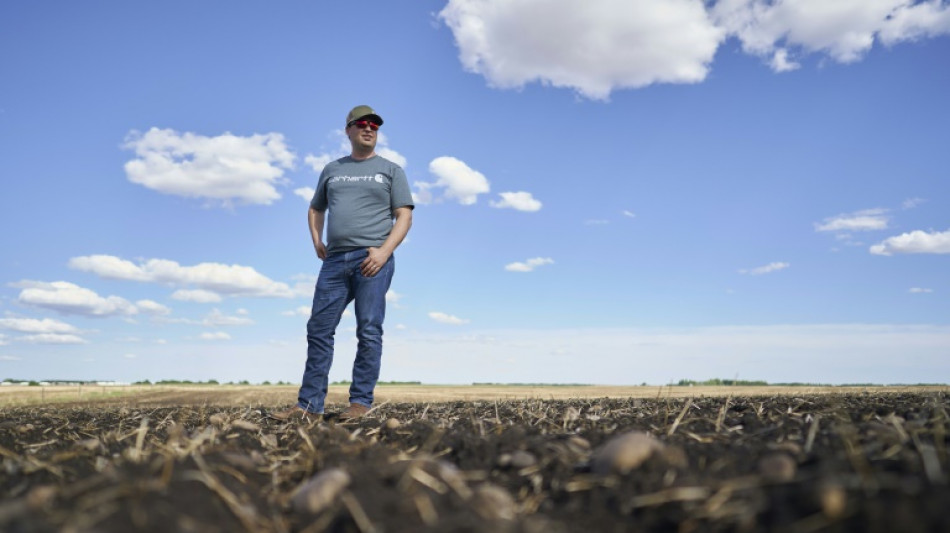
-
 Gold hits record, dollar drops as tariff fears dampen sentiment
Gold hits record, dollar drops as tariff fears dampen sentiment
-
As Dalai Lama approaches 90, Tibetans weigh future

-
 US defense chief shared sensitive information in second Signal chat: US media
US defense chief shared sensitive information in second Signal chat: US media
-
Swede Lingblad gets first win in just third LPGA start

-
 South Korea ex-president back in court for criminal trial
South Korea ex-president back in court for criminal trial
-
Thunder crush Grizzlies, Celtics and Cavs open NBA playoffs with wins

-
 Beijing slams 'appeasement' of US in trade deals that hurt China
Beijing slams 'appeasement' of US in trade deals that hurt China
-
Trump in his own words: 100 days of quotes

-
 Padres say slugger Arraez 'stable' after scary collision
Padres say slugger Arraez 'stable' after scary collision
-
Trump tariffs stunt US toy imports as sellers play for time

-
 El Salvador offers to swap US deportees with Venezuela
El Salvador offers to swap US deportees with Venezuela
-
Higgo holds on for win after Dahmen's late collapse

-
 El Salvador's president proposes prisoner exchange with Venezuela
El Salvador's president proposes prisoner exchange with Venezuela
-
Gilgeous-Alexander, Jokic, Antetokounmpo named NBA MVP finalists

-
 Thomas ends long wait with playoff win over Novak
Thomas ends long wait with playoff win over Novak
-
Thunder rumble to record win over Grizzlies, Celtics top Magic in NBA playoff openers

-
 Linesman hit by projectile as Saint-Etienne edge toward safety
Linesman hit by projectile as Saint-Etienne edge toward safety
-
Mallia guides Toulouse to Top 14 win over Stade Francais

-
 Israel cancels visas for French lawmakers
Israel cancels visas for French lawmakers
-
Russia and Ukraine trade blame over Easter truce, as Trump predicts 'deal'

-
 Valverde stunner saves Real Madrid title hopes against Bilbao
Valverde stunner saves Real Madrid title hopes against Bilbao
-
Ligue 1 derby interrupted after assistant referee hit by projectile

-
 Leclerc bags Ferrari first podium of the year
Leclerc bags Ferrari first podium of the year
-
Afro-Brazilian carnival celebrates cultural kinship in Lagos

-
 Ligue 1 derby halted after assistant referee hit by projectile
Ligue 1 derby halted after assistant referee hit by projectile
-
Thunder rumble with record win over Memphis in playoff opener

-
 Leverkusen held at Pauli to put Bayern on cusp of title
Leverkusen held at Pauli to put Bayern on cusp of title
-
Israel says Gaza medics' killing a 'mistake,' to dismiss commander

-
 Piastri power rules in Saudi as Max pays the penalty
Piastri power rules in Saudi as Max pays the penalty
-
Leaders Inter level with Napoli after falling to late Orsolini stunner at Bologna

-
 David rediscovers teeth as Chevalier loses some in nervy Lille win
David rediscovers teeth as Chevalier loses some in nervy Lille win
-
Piastri wins Saudi Arabian Grand Prix, Verstappen second

-
 Kohli, Rohit star as Bengaluru and Mumbai win in IPL
Kohli, Rohit star as Bengaluru and Mumbai win in IPL
-
Guirassy helps Dortmund past Gladbach, putting top-four in sight

-
 Alexander-Arnold lauds 'special' Liverpool moments
Alexander-Arnold lauds 'special' Liverpool moments
-
Pina strikes twice as Barca rout Chelsea in Champions League semi

-
 Rohit, Suryakumar on song as Mumbai hammer Chennai in IPL
Rohit, Suryakumar on song as Mumbai hammer Chennai in IPL
-
Dortmund beat Gladbach to keep top-four hopes alive

-
 Leicester relegated from the Premier League as Liverpool close in on title
Leicester relegated from the Premier League as Liverpool close in on title
-
Alexander-Arnold fires Liverpool to brink of title, Leicester relegated

-
 Maresca leaves celebrations to players after Chelsea sink Fulham
Maresca leaves celebrations to players after Chelsea sink Fulham
-
Trump eyes gutting US diplomacy in Africa, cutting soft power: draft plan

-
 Turkey bans elective C-sections at private medical centres
Turkey bans elective C-sections at private medical centres
-
Lebanon army says 3 troops killed in munitions blast in south

-
 N.America moviegoers embrace 'Sinners' on Easter weekend
N.America moviegoers embrace 'Sinners' on Easter weekend
-
Man Utd 'lack a lot' admits Amorim after Wolves loss

-
 Arteta hopes Arsenal star Saka will be fit to face PSG
Arteta hopes Arsenal star Saka will be fit to face PSG
-
Ukrainian troops celebrate Easter as blasts punctuate Putin's truce

-
 Rune defeats Alcaraz to win Barcelona Open
Rune defeats Alcaraz to win Barcelona Open
-
Outsider Skjelmose in Amstel Gold heist ahead of Pogacar and Evenepoel


Canadian Prairies farmers try to adapt to a warming world
Following repeated droughts, Canadian farmers are trying to adapt to a new era in agriculture marked by a warming world -- including by trapping snow in their fields, planting heat-resistant crops and seeding earlier in the season.
But it's unclear, they are the first to admit, if their slogging will bear fruit.
Squatting in the middle of a canola field in Alberta, on the western edge of Canada's vast Prairies region, Ian Chitwood surveys the shoots sprouting between long furrows of black soil.
His battle with the heat has been starting earlier every year.
By planting his crops earlier in the season, in May, Chitwood aims to "move up the flowering window," during which the plants are most vulnerable, in order to protect them from the heat in June.
But what his crops really need in the wake of a devastating drought in 2021, he acknowledges, is mild weather and humid soil.
That drought was a "once in 100 years event," says Curtis Rempel of the Canola Council of Canada.
That year, the west of the country sweltered under record high summer temperatures, with the mercury reaching 49.6 degrees Celsius (121.3 Fahrenheit).
"It sure had an impact on yields," reducing them by 50 percent, according to Rempel.
Such hits have had significant impacts on international markets, as Canada exports 90 percent of its canola harvest -- used mostly for cooking oil and biodiesel fuel.
- Water management -
Most canola crops are grown without requiring irrigation in the Prairies, the nation's agricultural heartland spanning nearly 1.8 million square kilometers (695,000 square miles). But the region is sensitive to droughts, whose frequency and severity have been steadily increasing.
In this region, explains Phillip Harder, a hydrology researcher at the University of Saskatchewan, in Saskatoon, "crop production relies on water that accumulates throughout the year." In other words, snow that accumulates over winter and soaks into the ground during the spring thaw.
But howling winds over fields that stretch as far as the eye can see have been blowing away much of that snow of late.
Some farmers have turned to a century-old solution of planting trees in and around their fields to trap the snow.
"In the wintertime when the snow blows it catches in the trees, and then it slowly soaks into the ground," explains Stuart Dougan, a 69-year-old farmer with a weather-beaten face.
In the spring and summer, the trees provide further shelter from the wind "so it's not taking the moisture from the crops," he adds.
Trees may pose new challenges, however, as modern agricultural equipment is much bulkier than in the 1930s when one could more easily plow around a tree trunk, points out Harder.
Alternatively, he recommends when harvesting crops to cut the plants higher on the stem, leaving longer "stubble" sticking out of the ground to "increase snow retention."
- Turning to science -
"We've always looked to keep as much stubble in place to catch the snow and reduce evaporation rates," says Saskatchewan farmer Rob Stone. He, like many Canadian farmers, stopped plowing his fields in the 1990s for this very purpose.
He's now experimenting with new genetically modified seeds that he says hold hope for the future of canola. Four small flags in the middle of his fields mark a test crop.
"As we find ones that are more tolerant (to heat), we will crossbreed them to make a new (plant) population," explains Greg Gingera, a genetics researcher.
Also in the works, adds Rempel, are several companies looking to develop "biologicals or bacteria or fungi that you add to the soil or spray on top of the plant to confer stress tolerance."
But it will be seven to eight years before a product is likely ready to be commercialized and widely available, he says.
In the meantime, farmers will have to make do.
C.Meier--BTB




